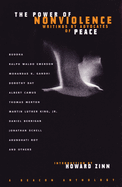 The fourteenth chapter of The Power of Nonviolence: Writings by Advocates of Peace contains Thomas Merton‘s 1962 essay The Root of War is Fear. As we have seen in the essays by Muste, Day, Addams, Gandhi, and Penn, religious conviction can be a great motivator to speak out for pacifism. Adopting the contemplative life of a monk, seems to have propelled Merton outward into addressing war and violence.
The fourteenth chapter of The Power of Nonviolence: Writings by Advocates of Peace contains Thomas Merton‘s 1962 essay The Root of War is Fear. As we have seen in the essays by Muste, Day, Addams, Gandhi, and Penn, religious conviction can be a great motivator to speak out for pacifism. Adopting the contemplative life of a monk, seems to have propelled Merton outward into addressing war and violence.
The title of Merton’s essay remind me of what the Duchess always says, “That which is not love, is fear.” Like Fromm’s essay of the prior week, Merton diagnoses the especially American idea that the only way to peace is through nuclear war as being a form of mental illness.
Merton immediately questions what is a Christian to do in a world where violence is considered to be the only answer. He quickly turns aside the choices of resigning oneself to the inevitability of the situation, using it as a reason to preach Apocalypse, or celebrating a nuclear victory over Atheist Communism. Merton finds there is only one appropriate response for a Christian:
That task is to work for the total abolition of war.
Merton sounds a call for all Christians to make their opposition to war and violence to be their prime activity, and to live by the principles of peace and nonviolence.
Merton traces the turn to violence as a rootlessness based in a loss of faith in God:
At the root of all war is fear, not so much the fear men have of one another as the fear they have of everything.
Merton finds that it is an unspeakable hatred of ourselves that causes us to hate others. We exaggerate their wrongs in order to disassociate ourselves from our wrongs. Such dissonance breeds violence as the only tool available to resolve our dilemma. We rationalize by destroying the other, we will free ourselves from our self-hatred. Merton is most frightened by the reality that the world powers have institutionalized this psychopathy.
Merton finds the only way back to sanity and peace is to recognize the good and evil in all of us. That means accepting that some of our ideas are illusions and that some our enemies ideas are motivated by good. He answers those that say we can only act if we believe in our righteousness, that we can only come to peace if we recognize that all of us have a piece of the answer and can only find the total solution by “working together.”
Merton turns to the power of prayer to move humanity in the right direction. He does not expect it will turn the morals of those in power. Merton merely hopes they will prevented committing a “fatal error.” He looks to God to teach people to love each other, even if they consider the other to be evil.
For only love — which means humility — can exorcise the fear which is at the root of all war.
Merton questions why why mark our postage with the phrase “pray for peace” while spending billions on weapons. He questions what we really believe in if the atheistic communists build the same weapons we do. He does not question the power of prayer when it bolsters our actions, but questions what we are really praying for when our actions contradict our prayers.
It may make sense for a sick man to pray for health and then take medicine, but I fail to see any sense at all in his praying for health and then drinking poison.
Merton’s prayer for peace is not only for the “Russians and Chinese” to turn away from making war, but more over for his own country to do so also. But he finds that none of them really want peace at all.
To some mean peace merely means the liberty to exploit others without fear of retaliation or interference.
Merton finds that people are baffled why their prayers for peace are answered by war. He finds that God has answered their prayers with what they asked for. They meant war when they asked for peace, and they got it.
If you love peace, then hate injustice, hate tyranny, hate greed –but hate these things in yourself, not in another.
Related articles
- Fromm: Unilateral Nuclear Disarmament (peacecouple.com)
- Nonviolence: Muste’s Getting Rid of War (peacecouple.com)
- Camus’ Neither Victims nor Executioners: The World Speeds Up(peacecouple.com)
- Camus’ Neither Victims nor Executioners: Toward Sociability (peacecouple.com)
- Camus’ Neither Victims nor Executioners: A New Social Contract(peacecouple.com)
- War, Peace and Sunshine: Peace Song for 3/12/2012 (peacecouple.com)
- Albert Camus’ Neither Victims nor Executioners: The Self-Deception of Socialists(peacecouple.com)
- Camus’ Neither Victims nor Executioners: Parody of Revolution (peacecouple.com)
- Wallace’s Are We Only Paying Lip Service to Peace? (peacecouple.com)


One thought on “Merton: The Root of War is Fear”